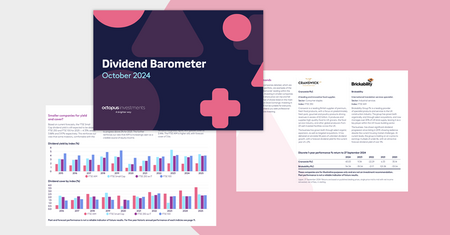“There was a case recently – it was an older lady who was very anxious. She’d been trying to sort out her will for ages, but nothing had happened.
So I called our legal connection, Edward, and explained the situation. I provided him with names and the soft facts. That way she was really quite comfortable when he called her. He knew what was going on and that was reassuring for her.”
James Lockyer, wealth management consultant at Weald Wealth Management.
When professionals work well together it can benefit every party. The referrer has a fuller offering by bringing in technical expertise. The connection gains a client. And, crucially, the client receives a better service.
Given the current climate, there’s never been a better time for advisers to be supporting professional connections who may be busier than ever.
Take private client solicitors for example. Coronavirus has heightened people’s sense of urgency to make, or update, a will. According to The Law Society, some firms have seen their business double in the past few weeks in light of the pandemic¹.
DeVere Group has also experienced a 76 per cent jump in the demand for wills since the outbreak began as more people rush to get their house in order².
Accountants are feeling the pressure too. With almost a quarter of the UK workforce placed on furlough³, there’s a mountain of admin and payroll documentation that needs to be completed for those on the Job Retention Scheme.
This is a unique opportunity for advisers to help accountants, solicitors and other professionals whose clients are now in need of financial advice.
But what do professionals look for before making an all important referral to an adviser?
I spoke to several connections I work with to get their take on how advisers can set themselves apart when establishing professional relationships.
1. Be highly qualified
There was a time when just being extremely qualified would be enough to see referrals from professionals.
Justin King, Chartered Financial Planner at MFP Wealth Management, built credibility through additional qualifications and accreditations. “We were ahead of the game,” he said. “We were in a small pool of advisers with these qualifications.”
Today, things are different. Qualifications are more commonplace and standard. “Now they are just hygiene factors,” he noted.
Does this mean it’s less important to be qualified now?
Not at all. While they might not set you apart, qualifications allow you to turn up to the table in the first place. Having industry standard qualifications and being accredited by organisations such as the Society of Later Life Advisers (SOLLA) and the Society of Trust and Estate Practitioners (STEP) show a willingness to go above and beyond.
Lynne Gadsden, a financial planner at Grovewood Wealth Management, told me that solicitors like referring their clients to her because she’s chartered, a fellow and SOLLA qualified.
James Hall, solicitor and managing partner of Gaddu and Hall, echoed a similar story from his perspective saying he wanted advisers to be “as qualified as possible.” As he put it: “If an adviser doesn’t want to be the best they can be, then why should I let them loose on my client?”
But while qualifications can be essential, on their own they’re not a guarantee you’ll make connections that will grow your business. They give you credibility, but they might not give you an edge when looking for referrals. That’s because professionals are looking for much more than qualifications.
2. Be clear on your proposition
Professionals tend to look for an adviser with an area of expertise when referring a client, rather than one who offers a very broad service.
It might be tempting to be everything to everyone, but this might not stand you in good stead if you want referrals from professional connections. It becomes difficult for a professional to see how such an adviser could add specific value to their client bank.
“Specialisation is important…being a generalist isn’t always the right thing,” Nick Simkins, accountant and partner at BDO, told me.
James Hall agreed, saying the most important thing was to stick to what you’re good at.
Professionals are looking to match a client to an adviser who has the right kind of specialist knowledge and technical ability to solve that client’s problem. So it’s important to be clear about what specific expertise you bring to the equation.
“What advisers don’t do particularly well is to set out their proposition clearly,” said Justin King, who also coaches advisers in how to run their business. “Being very clear about your proposition and who you can add value to is the key thing.”
If you are clear about what exactly you bring, it’s easy for a professional to match you with a client in need of advice — “You have to be perceived as an expert in your field,” he said.
Many advisers go to great lengths to build this credibility and industry perception. Lynne Gadsden, runs seminars with accountants and solicitors.
It’s a similar story for Justin King. He produced a documentary on retirees and baby boomers, co-wrote a book called Ready, Steady, Retire, and ran an event called the Retirement Café, where he brought in professionals to talk about subjects (such as dementia, nursing homes, wills, power of attorney and Office of the Public Guardian).
3. Be a good fit for clients
Even with a specialist offering, there’s more to the equation than technical ability.
How you interact with clients is crucial. This won’t come as a surprise, since advising a client is a very personal service. Professionals are looking to match their client with an adviser who, above all else, gets them. It’s a matching game.
James Lockyer, a financial adviser, said that his firm matches clients based on personality. If someone wants to speak to a more serious individual, they’d introduce one type of connection, whereas if they are looking for someone more laidback and jovial, they might introduce another connection.
Ask any professional and it’s a similar response. Nick Simkins, an accountant, said that client care skills and personality are most important — a client is only introduced to someone who he believes to be the best fit.
If you have a good awareness about the type of client you work well with, then this should inform your approach to working with other professionals. You should be clear about what expertise you bring and what kind of client you can help best.
James Hall told me he spends a lot of time getting to know his clients and therefore knows who they’re going to get on with.
“I know advisers who are incredible with business owners, very entrepreneurial. But if I were to put them in front of an elderly client, they might be too much. The client is unlikely to get on with them.”
4. Be collaborative
So you’re qualified, an expert in your field and are clear on your ideal client. What next?
Well, an accountant or solicitor will be looking for signs an adviser can work collaboratively.
On the one hand, the relationship is very much a commercial one. But on the other hand, professionals are making referrals to get the best outcomes for their clients. That means they’ll be looking for an adviser they can work well with, someone who’s on the same page.
It goes without saying that advisers and their connections need to be aware of what one another are doing.
Adviser James Lockyer said: “We will update professional connections once a result has been achieved. If we were investing into a VCT to save a client some income tax, then we might send a copy of the acknowledgment letter to the accountant to confirm. ‘This is why we’ve done this and this is what it’s achieved.’ The accountant loves that.”
At the moment in particular, a little collaboration could go a long way. Many accountants and solicitors will be crying out for educational content that can inform their conversations with clients. Advisers are well positioned to provide market commentary for example, or insight on how coronavirus might affect people’s finances.
It’s an opportunity for advisers to be on the front foot and really support their connections during this uncertain time. While it might not result in immediate referrals to the adviser, it will undoubtedly strengthen their relationship in the future.
How should I approach growing my business through professional connections?
Referring a client to a financial adviser is a very personal thing. It doesn’t happen overnight. And you’re unlikely to be successful with every connection you make.
“Sometimes you meet someone several times and you decide you’re not able to work together in the best interest of your clients and you leave it there,” James Hall said.
But this shouldn’t put you off.
Remember, you can improve your chances by meeting these criteria:
- Be highly qualified
- Be clear on your proposition
- Be a good fit for clients
- Be collaborative
A measured, patient approach will serve you best — it pays to narrow your focus and be selective. This applies to choosing the professionals you seek to work with, the scope of the service you offer and the kind of referral client you look for.
In light of the current circumstances, now might be a better time than any to really think about your proposition and who you’re best positioned to help.
If you’d like to hear more about how you can grow your business through professional connections, I’d love to talk to you about your own situation and how we can help. You can contact me at [email protected]








